Past Events
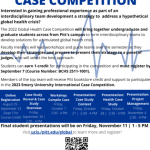
- Multiple Presenters
- Zoom & In Person
Pitt’s Global Health Case Competition is designed to give Pitt students from all campuses professional experience in developing innovative 21st century solutions and strategies to address a real-world global health issue.
Interdisciplinary teams of 4 to 6 graduate and undergraduate students will develop a plan to address a scenario in a holistic way based on information garnered during a series of presentations by experts along with a comprehensive library guide prepared specifically for the case study. Each team will present its strategy to a panel of experts, with the top team receiving cash prizes and support to participate in the 2023 Emory Morningside Global Health Case Competition.
Students participating in the competition have the option of earning 1-credit either at the undergraduate or graduate level (depending on their status.) The course must be added before the add/drop period, September 7, 2022 (course number: BCHS 2511-1001).
The case competition is sponsored by the School of Public Health’s Center for Global Studies, Global Health Student Association, the Center for Bioethics & Health Law, and Pitt’s Global Studies Center.
For the last two years Pitt’s winning team went on to place 3rd out of over 50 teams at Emory University’s global competition. View the 2022 first and second place presentations at Pitt’s competition here.
Oakland students are encouraged to attend all the following sessions in-person. Sessions will be available via Zoom for students from regional campuses and others who can’t attend in person. All students are expected to attend the in-person case presentations on November 11, 2022.

- various
- Pitt Global Hub and Posvar Galleria (1st Floor, Posvar Hall)
Learn more about all that is planned for the 2022-23 academic year by the Asian Studies Center, the Center for African Studies, the Center for Ethnic Studies Research, the Center for Latin American Studies, the Center for Russian, East European, and Eurasian Studies, the European Studies Center, and the Global Studies Center. Celebrate with us the recent award of 12 new federal grants and learn how that money will support faculty and students interested in the world. Find new opportunities to study, research, or teach about the world. This event is open to all faculty and students and is an opportunity to meet others who share similar interests. Representatives from Pitt's Global Experiences Office and Office of International Studies, as well as the Nationality Rooms, will also be on hand.

- Dr. Claudio Fabian Szlafsztein
- 4130 Posvar/Zoom
For this workshop CLAS has partnered with the Global Studies Center to introduce topics associated with the sustainability, development and conservation of the Amazon region. This course introduces significant topics associated with the sustainability of the Amazon region, where more than 30 million people live, inside an area comprising part of nine countries in South America. Almost 80% of the Amazon’s population is settled in urban areas.

- Zoom
Deadline to Apply April 22
Have you wished for the opportunity to work with colleagues at your school to globalize a unit, lesson, or module? Are you looking for an opportunity to have your students examine political, economic, social, cultural, ecological questions from multiple lenses? As part of the Summer Institute for Global Educators 2022 at the University Center for International Studies, we are excited to offer you the virtual space and resources to do such work! Science and French teachers might team up to offer a lesson on global warming in the francophone world; or Art, English, and Social Studies teachers might develop a unit on responses to the global refugee crisis in art and literature. We are looking forward to hearing your ideas! Synchronous and asynchronous daily sessions will be offered with time built in for participating educators to collaborate and develop activities, lesson plans and/or modules from the Institute’s offerings.
Apply as a team of 2-4 teachers from different subject areas at the same school. This opportunity is open to elementary, middle, and high school educators and administrators. Individual educator stipends and curriculum material grants will be provided to participating teams. Additional questions can be directed to Maja Konitzer at majab@pitt.edu.
Submit proposals here!

- online via Zoom
The free online Summer Institute for Global Educators, with the support of the Longview Foundation and the National Resource Center Program of the U.S. Department of Education, will allow in-service and pre-service secondary educators in all subject areas to develop courses and lesson plans with enhanced global and regional studies content. Educators from Title I schools are especially encouraged to apply. Online synchronous and asynchronous sessions will include the use of film and media, simulations, games, and technology to enhance global learning and teaching. Pitt College in High School (CHS) teachers will have the opportunity to meet with CHS staff on foregrounding global issues while meeting University and district requirements. Participating Pennsylvania teachers can apply for Act 48 credits.

- various
- Zoom
The free online Summer Institute for Global Educators, with the support of the Longview Foundation and the National Resource Center Program of the U.S. Department of Education, will allow in-service and pre-service secondary educators in all subject areas to develop courses and lesson plans with enhanced global and regional studies content. Educators from Title I schools are especially encouraged to apply. Online synchronous and asynchronous sessions will include the use of film and media, simulations, games, and technology to enhance global learning and teaching. Pitt College in High School (CHS) teachers will have the opportunity to meet with CHS staff on foregrounding global issues while meeting University and district requirements. Participating Pennsylvania teachers can apply for Act 48 credits.

- Zoom
The Alliance for Learning in World History is thrilled to announce its call for applications for "New Approaches to Frontier History" a professional development workshop for world history teachers at all levels. The virtual event will be held on Saturday, June 11 from 10:30 am - 4:00 pm. All accepted participants will receive a $200 stipend. The event provides teacher's with the opportunity to workshop their own syllabus or assignment that engages with indigenous history. Accepted participants will be invited to attend a curriculum workshop cosponsored by Pitt's Asian Studies Center. Applications are due April 15, 2022.
The event will feature three keynote addresses from experts in the field of frontier history:
Dr. Veronica Castillo-Munoz, UC Santa Barbara, “Teaching about the Border: Border Crossings and the Making of the US-Mexico Borderlands”
The U.S.-Mexico border is over two thousand miles long and ranks among the longest borders in the world. Understanding the formation of communities that facilitate border crossings and cultural interactions between these two nations is now more important than ever. This workshop will focus on the best practices to teaching about the border as well as the broader history and experiences of border people.
Dr. James Hill, University of Pittsburgh, “Whose Frontier Is It? Decolonizing Narratives in World History”
This talk seeks to reframe frontier histories from the perspectives of Indigenous peoples. As a first step, capturing the historical views of the colonized towards colonizer is an admirable goal. However, decolonizing efforts should not stop there. A fully decolonized history should demonstrate how Indigenous peoples have adapted to and coped with colonialism, countering narratives of their disappearance and erasure. Indigenous peoples have moved beyond mere survival by refashioning themselves to endure and thrive in a postcolonial landscape.
Dr. Matt Matsuda, Rutgers University, “Water’s Edge: Histories and Frontiers in Pacific and Oceanian Worlds”
Histories of the Pacific world have, over the last decades, been shaped by examinations of frontiers and places of encounter, both insular and connected. Scholars have pursued “unending frontiers,” “oceans unbounded,” “waves across the South,” and a “sea of islands” to illuminate new ways of telling histories and underscore long silenced voices and pasts. We will begin by mapping millennia of the translocal, examine traditions of navigation and diaspora, look to commerce and conquest, seek out lives and legacies of acculturation and persistence, understand imperial power and migrations, and the promises and perils of labor, migration, and a changing oceanic environment. We’ll pay respects to a canoe, a sea creature, a saint, a warrior, and a woman who cared for children, all living in and making their presence known across the centuries.
Email ALWH@pitt.edu with any questions
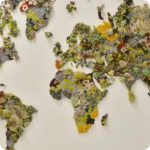
- Multiple
- Contemporary Craft (5645 Butler St. Pittsburgh, PA 15201)
Join the Global Studies Center as we continue our programming as part of the Global Sustainability Series by meeting at Contemporary Craft. This workshop will focus on PA Common Core standards related to agriculture, sustainability, and renewable and natural resources. It will include a faculty led presentation, a hands-on art activity that can be done with students, and a walk through the upcoming Fiber Arts International Exhibit at Contemporary Craft.
Dinner and Act 48 credits will be provided.
Date: Friday, May 13, 2022
Time: 6:00pm-8:00pm
Location: Contemporary Craft (5645 Butler St. Pittsburgh, PA 15201)
Cost: $10
Hands-on Activity:
Join Contemporary Craft instructor and paper maker Katy Dement, as she leads everyone in making simple small square Hand made paper collages. The projects will include"pocket mining" for single use plastics to include as well as imagery featuring reclaimed materials from packaging.
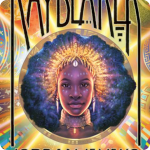
- Zoom
Global Issues Through Literature (GILS)
Fall and Spring 2021-22: Imagining Other Worlds: Globalizing Science Fiction and Fantasy
This reading group for K-12 educators explores literary texts from a global perspective. Content specialists present the work and its context, and participants brainstorm innovative pedagogical practices for incorporating the text and its themes into the curriculum. Sessions this year will take place virtually on Thursday evenings from 5-8 PM (EST). Books and three Act 48 credit hours are provided.
Register for the reading groups here - https://www.ucis.pitt.edu/global/gils
Contact Maja Konitzer with questions at majab@pitt.edu
Co-sponsored by the University of Pittsburgh Center for African Studies, Africa Access, and the Title VI Outreach Council of the African Studies Association
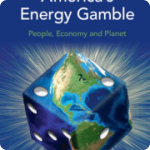
- Tracy Wazenegger and Shanti Gamper-Rabindran
- Zoom
This professional development opportunity for K-12 educators will focus on the book "America's Energy Gamble: People, Economy, and Planet" by Shanti Gamper-Rabindran, associate professor in the Graduate School of Public and International Affairs at the University of Pittsburgh. The workshop will be led by Tracy Wazenegger, Science and Global Issues educator and is designed for educators across ages and disciplines to incorporate global themes of sustainability, climate change, and the energy crisis into their classroom.
Books are available on a first come first serve basis. Act 48 credits will also be available.
The book details how any administration intent on pursuing a pro-fossil policy, when Congress fails to act as a check, can change governance rules to permanently entrench oil and gas extraction and reliance in the United States and to cripple regulatory agencies. The Trump administration’s actions which violated traditional bipartisan values of economic prudence, environmental stewardship and respect for democratic norms, damaged Americans’ health, economy and governing institutions.
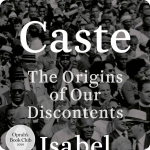
- Dr. Nico Slate, Professor of History and Department Head at Carnegie Mellon University
- Zoom
We are excited to continue our collaboration with the Pittsburgh Arts & Lectures "Ten Evenings" series. The Global Studies Center will be once again hosting "Four Evenings: Global Literary Encounters" pre-lecture discussions that put prominent world authors and their work in global perspective. The series is co-sponsored by the Osher Lifelong Learning Institute.
Open to all, these evening discussions, conducted by Pitt experts prior to author events with Pittsburgh Arts and Lectures, provide additional insight on prominent writers and engaging issues. You can register for the book discussions here - https://www.ucis.pitt.edu/global/caste
Poetically written and brilliantly researched, Caste invites us to discover the inner workings of an American hierarchy that goes far beyond the confines of race, class, or gender. A book steeped in empathy and insight, Caste explores, through layered analysis and stories of real people, the structure of an unspoken system of human ranking and reveals how our lives are still restricted by what divided us centuries ago. Wilkerson rigorously defines eight pillars that underlie caste systems across civilizations, including divine will, heredity, and dehumanization. She documents the parallels with two other hierarchies in history, those of India and of Nazi Germany, and no reader will be left without a greater understanding of the price we all pay in a society torn by artificial divisions.
For questions and more information, contact Maja Konitzer at majab@pitt.edu.
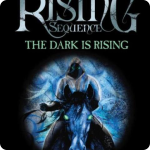
- Emilee Ruhland
Global Issues Through Literature (GILS) Fall and Spring 2021-22: Imagining Other Worlds: Globalizing Science Fiction and Fantasy
April 28th, 2022 - "Dark is Rising" by Susan Cooper. Co-sponsored by the European Studies Center
Facilitated by Emilee Ruhland, who graduated this spring with her Master’s in Critical and Cultural Studies from the University of Pittsburgh, and she holds an MA in English from North Dakota State University. Emilee is a medievalist and has written about Beowulf, Joan of Arc, Notre Dame de Paris, and Gothic architecture in Pittsburgh. She works in higher ed communications, most recently as the Communications Coordinator for the European Studies Center.
This reading group for K-12 educators explores literary texts from a global perspective. Content specialists present the work and its context, and participants brainstorm innovative pedagogical practices for incorporating the text and its themes into the curriculum. Sessions this year will take place virtually on Thursday evenings from 5-8 PM (EST). Books and three Act 48 credit hours are provided.
Register for the reading groups here- https://www.ucis.pitt.edu/global/gils
Contact Maja Konitzer with questions at majab@pitt.edu
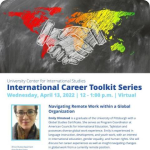
- Emily Olmstead
- Virtual Format - Zoom
Emily Olmstead is a graduate of the University of Pittsburgh with a Global Studies Certificate. She serves as Program Coordinator at American Councils for International Education, Tajikistan and possesses diverse global work experience. Emily is experienced in language instruction, development, and youth work, with an interest in international education, gender equality, and human rights. She will discuss her career experiences as well as insight navigating changes in global work from a currently remote position.
To Register:https://pitt.zoom.us/meeting/register/tJUpf-Crqj4jHNfcF98DJhdvp2ihDYLi5W5F

- Posvar 4130
Antimicrobial resistance (AMR) is a leading cause of death around the world, with the highest burdens in low-resource settings, and is expected to grow exponentially to cause around 10 million deaths annually in 2050. It is defined by high degrees of complexity given its international, multisectoral, ‘one health’ and ‘creeping’ features, which creates significant challenges for good governance. In addition, only 0,5% of all AMR related research comes from the social sciences, which indicates that we know relatively little about the behavioral and institutional aspects of antibiotics. It is also typically referred to as a low-salient political issue. This talk will introduce three dimensions of European governance of antibiotics; first, how experts, typically top senior bureaucrats, create an ‘administrative action space’ when politicians fail to raise the issue; second, the networking dynamics among domestic bureaucracies to create collaborative governance; and thirdly, the role and function of the EU Commission to act as a third-party enforcer in solving the large-scale collective action dilemma of AMR.
Daniel Carelli is a PhD Candidate in political science at the University of Gothenburg. His dissertation investigates how administrative traditions and bureaucratic autonomy affect inter-bureaucratic collaboration around the issue of antimicrobial resistance in Europe.

- Posvar 4130
Antimicrobial resistance (AMR) is a leading cause of death around the world, with the highest burdens in low-resource settings, and is expected to grow exponentially to cause around 10 million deaths annually in 2050. It is defined by high degrees of complexity given its international, multisectoral, ‘one health’ and ‘creeping’ features, which creates significant challenges for good governance. In addition, only 0,5% of all AMR related research comes from the social sciences, which indicates that we know relatively little about the behavioral and institutional aspects of antibiotics. It is also typically referred to as a low-salient political issue. This talk will introduce three dimensions of European governance of antibiotics; first, how experts, typically top senior bureaucrats, create an ‘administrative action space’ when politicians fail to raise the issue; second, the networking dynamics among domestic bureaucracies to create collaborative governance; and thirdly, the role and function of the EU Commission to act as a third-party enforcer in solving the large-scale collective action dilemma of AMR.
Daniel Carelli is a PhD Candidate in political science at the University of Gothenburg. His dissertation investigates how administrative traditions and bureaucratic autonomy affect inter-bureaucratic collaboration around the issue of antimicrobial resistance in Europe.
- ‹ previous
- 28 of 60
- next ›
